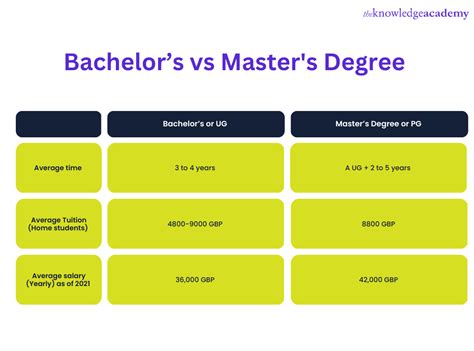Overview
In the educational realm, the hierarchy of degrees typically progresses from associate’s to bachelor’s, master’s, and finally doctoral degrees. However, the specific requirements and the perceived value of each degree can vary depending on the field of study, industry, and geographical location. This article aims to provide a comprehensive analysis of the relative standing of master’s and bachelor’s degrees in various aspects, assisting individuals in making informed decisions about their educational pursuits.

Master’s Degree vs Bachelor’s Degree: Key Differences
Level of Education
A master’s degree is a postgraduate degree that is typically pursued after completing a bachelor’s degree. It requires additional coursework, research, and often a thesis or capstone project. Master’s programs typically take one to two years to complete, depending on the program and the student’s pace.
Academic Rigor
Master’s programs are generally considered to be more academically rigorous than bachelor’s programs. The coursework is more specialized, and students are expected to demonstrate a deeper understanding of their chosen field. Master’s programs often involve more research, analytical thinking, and critical evaluation.
Specialization
Master’s degrees allow students to specialize in a specific area within their field of study. This specialization can prepare students for advanced roles in their chosen profession or for further academic pursuits. For example, a student with a bachelor’s degree in business may pursue a master’s degree in finance, marketing, or human resources.
Value in the Job Market
Earning Potential
In many industries, a master’s degree can lead to higher earning potential. According to the U.S. Bureau of Labor Statistics, workers with a master’s degree earn, on average, 18% more than those with only a bachelor’s degree. In some fields, such as engineering, law, and healthcare, a master’s degree is often a requirement for advancement to higher-level positions.
Career Advancement
A master’s degree can also open doors to career advancement opportunities. Many employers value the specialized knowledge and skills that are acquired through a master’s program. Having a master’s degree can make a candidate more competitive for promotions and leadership roles.
Job Security
In some industries, a master’s degree can provide greater job security. During economic downturns, employers may be more likely to retain employees with higher levels of education. Additionally, a master’s degree can provide additional skills and qualifications that make it easier for individuals to transition to other fields if necessary.
When to Consider a Master’s Degree
Career Goals
Individuals who aspire to leadership roles, specialized positions, or higher earning potential should consider pursuing a master’s degree. If a bachelor’s degree is not sufficient to meet your career goals, a master’s degree can provide the necessary qualifications and skills.
Field of Study
The value of a master’s degree can vary depending on the field of study. In some fields, such as engineering, law, and education, a master’s degree is often required for licensure or certification. In other fields, such as the arts or humanities, a master’s degree may be less advantageous.
Financial Considerations
Pursuing a master’s degree can be a significant financial investment. Individuals should carefully consider the potential return on investment and their financial situation before making a decision.
Tips for Choosing a Master’s Program
Research Your Options
Before applying to a master’s program, thoroughly research your options. Consider the reputation of the program, the curriculum, the faculty, and the career outcomes of graduates.
Get Involved in the Admissions Process
Attend informational sessions, connect with faculty members, and network with current students. This will help you learn more about the program and demonstrate your interest.
Apply Strategically
Submit a strong application that showcases your qualifications and goals. Write a well-crafted personal statement, provide letters of recommendation from respected individuals, and ensure that your transcripts meet the program’s requirements.
Common Mistakes to Avoid
Not Considering Your Career Goals
Don’t pursue a master’s degree simply because it is expected or because others are doing it. Make sure that the degree aligns with your long-term career aspirations.
Choosing a Program Based on Convenience
Don’t choose a master’s program based solely on convenience or location. Consider the quality of the program, the reputation of the institution, and the potential career benefits.
Not Researching Financial Aid
Don’t assume that you won’t qualify for financial aid. Research scholarships, grants, and loans to help finance your master’s degree.
Conclusion
Whether a master’s degree is higher than a bachelor’s degree is a complex question that depends on a variety of factors. In terms of level of education, academic rigor, and specialization, a master’s degree is generally considered to be higher. However, the value of a master’s degree in the job market can vary depending on the field of study, industry, and geographical location. Individuals should carefully consider their career goals, financial situation, and the potential return on investment before deciding whether to pursue a master’s degree.
